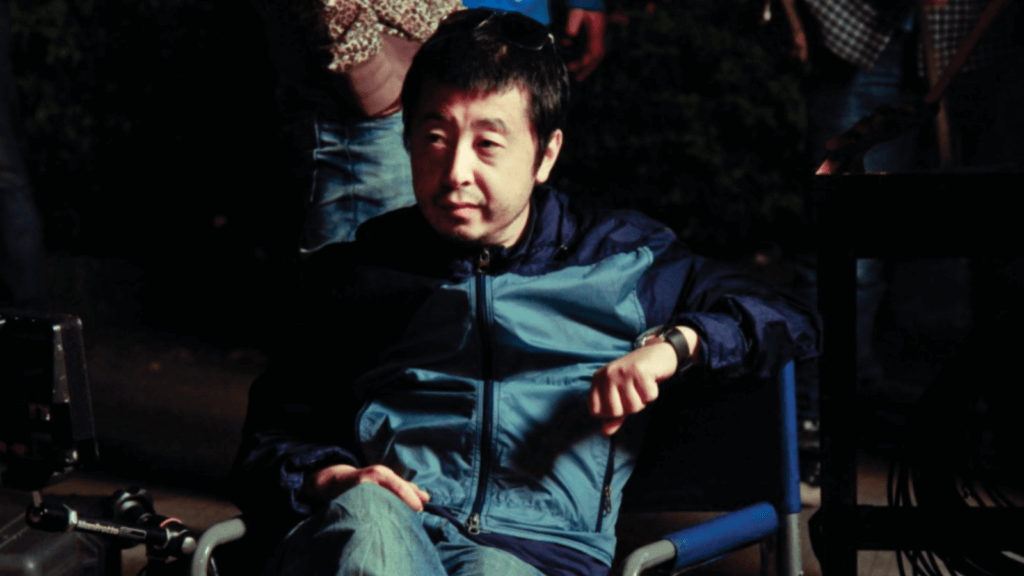
Filmmaker in Focus: Jia Zhangke
By Brian Eggert | April 2, 2025
Note: The “Filmmaker in Focus” series about Jia Zhangke is currently exclusive to DFR’s Patreon. Join today for access to these and other exclusive works, or purchase access to these reviews as a collection.
No contemporary filmmaker has chronicled the transformation of modern China so thoughtfully as Jia Zhangke. From his independent and experimental works in the 1990s and 2000s to his embrace of genre in the 2010s, Jia has captured the ongoing struggle between tradition and progress. Linking historical video, memory, and national history, his films are both personal and sweeping. They often follow everyday individuals who navigate a world changing faster than they can process. Whether depicting the crumbling remains of industrial towns, the upheaval caused by gentrification, or cultural alienation in a society beset by globalization, Jia’s cinema meditates on the human toll of China’s rapid change.
In this “Filmmaker in Focus” series about Jia’s work, I explore the recurring themes and stylistic signatures that characterize the Sixth Generation filmmaker’s body of work. Stylistically, his films often dabble in documentary realism, relying on non-professional actors, extended takes, and brooding compositions that juxtapose his characters against an infrastructure in flux. However, Jia does more than merely observe; he often weaves elements of fantasy, surrealism, and pop culture into his commentary. His consideration of contemporary China is often poetic, even playful.
Central to Jia’s cinema is a focus on overlooked and marginalized groups—the ordinary workers, miners, petty criminals, and migrants who are steamrolled by China’s grand economic ambitions. In his debut Xiao Wu (1997), he captures a generation caught between Maoist ideology and the seductive promises of Westernization. His later films, including The World (2004) and A Touch of Sin (2013), reveal how capitalist systems create economic disparity and lead to moral corruption.
Along the way, China changes, and Jia documents those changes throughout his filmography. Yet, some of his films also chart the evolution within a sprawling narrative. In Mountains May Depart (2015), Jia’s story unfolds over a quarter century and leaps into its then-future. In his crime saga Ash Is Purest White (2018), a woman spends a mere five years in prison, but upon her release, the world has changed so much that it has become almost unrecognizable. Jia’s films tell stories not just about contemporary China but also about time and impermanence.

Aesthetically, Jia’s films balance austerity with experimentation. He conveys the passage of time with long takes, while his footage of real people and city streets glimpses a China that, by the time you see the film, may no longer exist. But Jia also blends his realism with touches of the purely cinematic: abrupt bursts of violence, surreal details, and even the occasional UFO. This tension between realism and cinematic tropes reflects the inner conflict of modern China, where the old and the new, the authentic and the artificial, remain in tension.
Through this series of four reviews and one essay in The Definitives, I delve into how Jia Zhangke’s films serve as both social documents and deeply personal expressions. His work resists easy categorization, oscillating between documentary and fiction, evidence and poetry. But at its core, his cinema captures China in transition and how humanity races to keep up.
With each piece, I endeavor to uncover the layers of Jia’s storytelling that make his films resonate both with and far beyond their cultural specificity. Whether you’re a longtime admirer of his work or new to his films, this short series hopes to illuminate one of cinema’s most fascinating auteurs.
The Films:
• Xiao Wu (1997)
• The World (2004)
• A Touch of Sin (2013)
• Mountains May Depart (2015)
• Ash Is Purest White (2018)
Consider Supporting Deep Focus Review
I hope you’re enjoying the independent film criticism on Deep Focus Review. Whether you’re a regular reader or just occasionally stop by, please consider supporting Deep Focus Review on Patreon or making a donation. Since 2007, my critical analysis and in-depth reviews have been free from outside influence. Becoming a Patron gives you access to exclusive reviews and essays before anyone else, and you’ll also be a member of a vibrant community of movie lovers. Plus, your contributions help me maintain the site, access research materials, and ensure Deep Focus Review keeps going strong.
If you enjoy my work, please consider joining me on Patreon or showing your support in other ways.
Thank you for your readership!
Brian Eggert | Critic, Founder
Deep Focus Review




